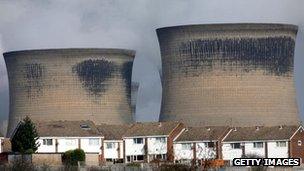SSE boss Ian Marchant warns of risk of 'lights going out'
- Published

Ferrybridge is one of five power stations affected
The boss of the energy firm SSE has warned that "there is a very real risk of the lights going out" in Britain.
Ian Marchant said the government, external was significantly underestimating the scale of the capacity crunch facing the country.
He was commenting on the company's decision to cut back on power generation at five sites.
The energy regulator, Ofgem, has also warned of an increased risk of a blackout.
In February it predicted power station closures could mean a 10% fall in capacity by April alone.
SSE points out that the regulator did not take into account its plans to cut power generation when the warning was issued and that therefore, makes the warning even more stark.
Ofgem's chief executive Alistair Buchanan told the BBC that Britain "would be very tight on power station capacity in three to five years' time".
SSE's Mr Marchant added that the government "can reduce this risk significantly by taking swift action to provide much greater clarity on its electricity market reforms and bringing forward capacity payments for existing plants from 2018 to 2014".
'Unprecedented challenge'
Energy minister John Hayes denied the government was being complacent, saying he was confident that its approach, combined with the responsiveness of the market, would provide secure supplies.
"We're alive to the challenge facing us. The Bill before Parliament will set the conditions for the investment needed to keep Britain's lights on in the long term," he said.
"The amount of spare power available today is currently comfortable, " he added. "We will make sure it stays manageable.
"We have an insurance policy - the capacity market. We're considering how and when this can best be used to bring about any necessary increase in supply or reduction in demand."
SSE is reducing its energy generation by 2,000MW over the next year. The power stations affected are Ferrybridge, Keadby, Slough, Uskmouth and Peterhead. It is also postponing further investment in gas-fired electricity generation until at least 2015.
Scotland's Energy Minister Fergus Ewing expressed concern about the decision.
"We are facing an unprecedented challenge in ensuring security of future supply while making the transition to a low carbon generating mix," he said.
"We can deliver a significant amount of that secure low carbon energy from Scotland. But the UK Government must deliver its Electricity Market Reform programme quickly and effectively to give confidence in the future market and allow companies to plan and invest for a future secure, stable and broad based electricity generating mix."
More warnings?
About 150 jobs are affected by the news, but the company is confident that most employees will be redeployed.
Peterhead has been named as one of two preferred bidders in the £1bn competition to encourage the development of carbon capture and storage technology. The announcement will have no impact on these plans.
SSE is one of the UK's six big power companies.
It says despite efforts to cut costs in generating power, costs have increased over the past year, meaning that they are in some cases losing money. SSE thinks it is unlikely to be the last energy company to warn about the tight capacity situation.
"The kind of decisions SSE is taking, to close existing generation plant on the one hand and delay investing in new plant on the other, is likely to be reflected across the industry in the coming months," said Paul Smith, managing director of SSE.
Cold snap?
Separately, a study by the Reuters news agency shows that, if the current cold snap continues as forecast, the country could run out of stored gas supplies as soon as 8 April. In that case supplies to big industrial customers may be cut, as in 2010 when there were severe gas shortages.
The Department of Energy and Climate Change said it was monitoring the situation closely.
Britain's biggest gas supplier, Centrica, has already implemented some withdrawal restrictions
- Published20 March 2013
- Published20 March 2013
- Published19 February 2013